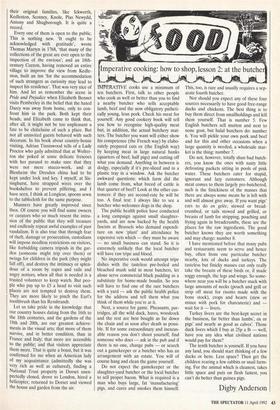'Imperative cooking: how to shop, lesson 2: at the butchel
IMPERATIVE cooks use a minimum of ten butchers. First, talk to other people who cook as well or better than you to find a nearby butcher who sells acceptable lamb, beef and the now obligatory patheti- cally young, lean pork. Check his meat for yourself. Any good cookery book will tell you how to recognise high-quality meat but, in addition, the actual butchery mat- ters. The butcher you want will either show his competence (the French way) by elabo- rately prepared cuts or (the English way) by keeping meat in large natural hunks (quarters of beef, half pigs) and cutting off what you demand. Anything in between is dodgy, especially if it's pre-sliced and in a plastic tray in a window. Ask the butcher awkward questions: which farm did the Iamb come from, what breed of cattle is that quarter of beef? Look at the other cus- tomers: if they are second-rate he will be too. A final test: I always like to see a butcher who welcomes dogs in the shop.
The public health police have conducted a long campaign against small slaughter- yards, and are now backed by the health fascists at Brussels who demand expendi- ture on new 'plant' and attendance by expensive vets which — they must be aware — no small business can stand. So it is extremely unlikely that the local butcher will have raw tripe and blood.
No imperative cook would attempt tripe dishes with the tasteless pre-boiled and bleached mush sold in most butchers, let alone serve commercial black pudding as a substitute for home-made boudin. So you will have to find one of the rare butchers with a yard — ask the public health police for the address and tell them what you think of them while you're at it.
Next, a source for game. Pheasants, par- tridges, all the wild duck, hares, woodcock and the rest are best bought as far down the chain and as soon after death as possi- ble. If for some extraordinary and inexcus- able reason you don't shoot yourself, find someone who does — ask in the pub and if there is no one, change pubs — or search out a gamekeeper or a butcher who has an arrangement with an estate. You will of course hang and clean the game yourself.
Do not expect the gamekeeper or the slaughter-yard butcher or the local butcher to sell proper bacon. What is required is a man who buys large, fat 'manufacturing' pigs, and cures and smokes them himself. This, too, is rare and usually requires a sep- arate fourth butcher.
Nor should you expect any of these four sources necessarily to have good free-range ducks and chickens. The best thing is to buy them direct from smallholdings and kill them yourself. That is number 5. Few English butchers sell mutton and next to
none goat, but halal butchers do: number 6. You will pickle your own pork and beef and for this and other occasions when a large quantity is needed, a wholesale mar- ket is the thing: number 7.
Do not, however, totally shun bad butch- ers, you know the ones with nasty little defrosting packets sitting in pools of pink water. These butchers cater for stupid, ignorant and lazy customers. Although meat comes to them largely pre-butchered, such is the finickiness of. the masses that there are always some meats he is left with and will almost give away. If you want pigs'
ears to do en gelee, stewed or bread- crumbed, or tails stewed and grilled, or
breasts of lamb for stripping, poaching and frying again in breadcrumbs, these are the places for the raw ingredients. The good butcher knows they are worth something and may charge: number 8.
I have mentioned before that many pubs and restaurants seem to serve and hence buy, often from one particular butcher nearby, lots of ducks and turkeys. The tasteless but finicky masses can only really take the breasts of these birds or, if made soggy enough, the legs and wings. So some- where near you will be a butcher stuck with large amounts of necks (poach and grill or strip off meat for risotto made with the bone stock), crops and hearts (stew or mince with pork for charcuterie) and — wait for it — livers.
Turkey livers are the best-kept secret in the business, far better than lambs', ox or pigs' and nearly as good as calves'. Those duck livers which I buy at 25p a lb — well, have you any idea what civilised nations would pay for them?
The tenth butcher is yourself. If you have any land, you should start thinking of a few ducks or hens. Less space? Then get the children rearing a few rabbits or snail farm- ing. For the animal which is cleanest, takes little space and puts on flesh fastest, you can't do better than guinea pigs.
Digby Anderson


















































 Previous page
Previous page